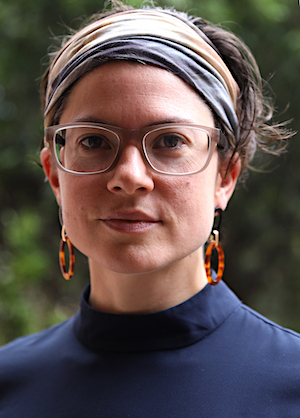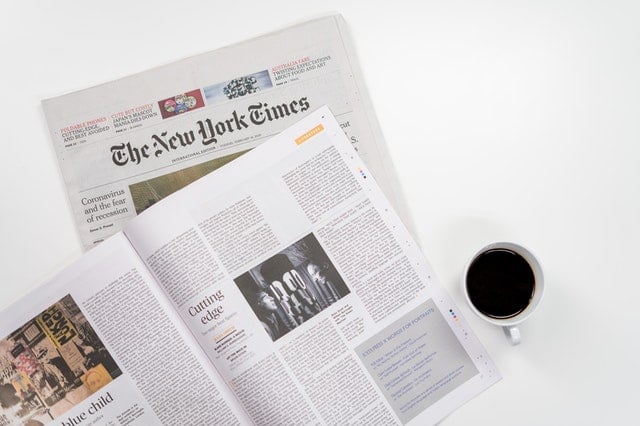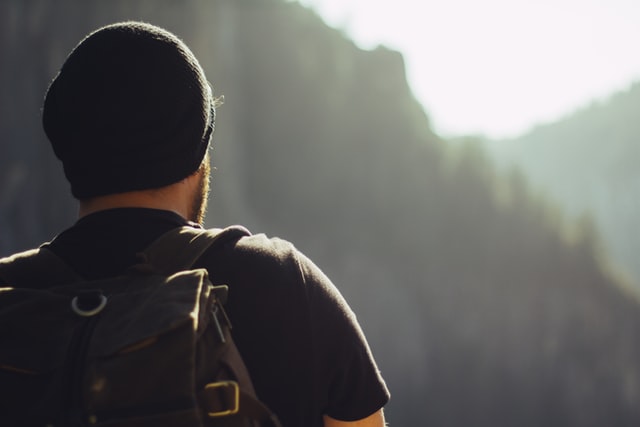With the world losing trust in mainstream media news, budding journalists are losing faith in their careers, reports Nisha Karyn.
* Concentration of ownership in dominant media has played a part in falling trust
* Young journalists express their struggles in finding work as a result
* Shifting formats have been another contributor to depleting confidence
* Corporate outlets are still the first place to go to for comprehensive news
* Impacts of media bias on society are more exaggerated than the reality
* Early education in critical thinking can improve the industry and public impacts from media bias
* The Royal Commission into Australia’s news media will be one to watch
According to a Roy Morgan survey of 1,963 Australians, newspaper journalists were given a 10% honesty rating while TV reporters were given 16%.
 Denby Weller, Video Journalism Lecturer at Swinburne University (pictured) attributed the dip in confidence to the concentration of ownership in Australia’s news companies.
Denby Weller, Video Journalism Lecturer at Swinburne University (pictured) attributed the dip in confidence to the concentration of ownership in Australia’s news companies.
“NewsCorp is a dominant player in Australian newspapers, and our newspaper ownership concentration is among the highest in the world. The risk of bias and misinformation is quite high with that kind of concentration,” she said.
According to The Conversation, News Corporation accounted for 59% of all daily newspaper sales, being 17.3 million papers a week. This made it Australia’s most influential paper publisher “by a considerable margin”. Murdoch owned 14 of 21 metro daily and Sunday newspapers.
“My PhD started out as an investigation of the socio-political costs of fake news. One of the key concerns that I have is that we live in democratic societies where we base our choices of leadership on what we see in the news. That’s how journalism functions as the fourth estate. If the news is wrong, then we’re basing our views on non-facts. I think that’s a real threat to democracy.”
Journalism student, John Craig, 21, said that he had noticed a disconnect between the journalistic morals taught in his lectures and the reality of working in large media corporations.
“The inherent nature of any media corporation is that they have vested interests and an ideology or agenda is always being pushed,” he said. “For example, Rupert Murdoch is a media mogul, and therefore had a vested interest in promoting the media ownership laws introduced in March. It required tech giants Google and Facebook to split part of their profit with companies that create news – those companies being owned by Murdoch. So, whether or not you agree with this stance, Murdoch utilised his media outlets to promote his ideological stance.”
Amy Nasri, 21, journalism student at the University of Technology Sydney (UTS) who has done a variety of industry internships said that she did not hold out much hope of finding a job in an ethical media company.

“If most of Aussie news circulating is owned by one guy who is right wing, conservative and has a monopoly on the journalism industry, that means that those are most of the job opportunities that I would get,” Miss Nasri giggled nervously. “News Corp, The Australian and more are places I see having the most job ads when I go job seeking. I don’t feel comfortable working in a Murdoch machine.
“But this industry, as mistrusted as it is, has forced me to take whatever opportunities are available.”
Mr Craig said, “I wouldn’t call myself a happy budding journalist anymore. I’ve been turned off the profession by the stress and the toxic journalists I’ve met over the years who display that disconnect between pleasant classroom ethics and unpleasant workplace ethics well.”
Diminishing public opinion has certainly affected media resources and jobs.
According to Job Outlook, the number of journalists and other writers in Australia fell from 25,100 in 2014 to 19,700 in 2019.
Miss Nasri says she and many of her peers felt forced into unfavourable opportunities. For instance, her friend took up an internship at 2GB, where Australian commentator Andrew Bolt worked.
“I remember asking her how she felt and she said she had mixed feelings. She said it was an internship opportunity, but she reluctantly took it. It was all that was available.”
Miss Nasri admitted that the perilous hunt for a job sometimes took a toll.
“I feel like I can’t say no to any opportunity and that creates burnout in me. Last year, I wasn’t able to manage time. That can be directly attributed to the fact that, in my head, I need to do everything I can. Otherwise I will not be able to go into the industry.”
The decline in jobs within the industry has certainly caused much distress among students, graduates and other budding journalists alike.
Mr Craig said that he had little faith in finding paid work, especially in a field with high labour supply and relatively low demand.
“It’s difficult to take up unpaid jobs in a city as expensive as Sydney. I know if I wanted to get an unpaid job, I probably could. But the search would be so soul-crushing and my willingness to keep the job would be so low knowing I wasn’t getting paid enough…”
Martha Hanley, 23, journalism graduate from UTS expressed her worries about her chances within the field. “I have contemplated putting my career in journalism aside and considered focusing on full-time work in a non-related industry instead. With my limited experience in the industry, the concept of stability or consistency is very far-fetched.”
Apart from media ownership, Miss Nasri and Ms Weller agreed that depleting trust and rise in media bias has also come from shifting news formats. An example is a greater push for opinion pieces as well as changes in platform layouts.
Ms Weller said, “In newspapers, opinion writing was only present in the editorial and op-ed pages and nowhere else. But now, when you open a newsfeed on Facebook, opinion stories are scattered in with news stories and it’s much harder to differentiate between the two. That’s an issue for the audience because opinion can be another word for bias.
“Another thing that social media does is its way of presenting news headlines where it’s harder to see who the original publisher was,” added Ms Weller.
“If you share something in my newsfeed, then I see your name more prominently than I see the source of the information. I’m judging do I trust you, or freedomplatform.tv. As an audience, when you’re in that critical moment where you’re deciding ‘do I believe this or not’, that’s a strong credibility indicator that’s not as obvious as it used to be.”
Miss Nasri said that despite the discouraging environment and job prospects, she would still trust mainstream media more than any other.
“Quality of content is where the crux of journalism lies. It lies in the investigation and deeper long form, a level of quality not found anywhere else.
“I know a lot of great journalists who work at the Australian or News Corp, and they do fantastic articles nevertheless. One of the journalists that came to UTS worked in The Australian. He said, yes, he works for Murdoch but not directly under him. So, when he writes articles he might get into arguments with his editors, but that’s pretty much like any other newsroom. So, there are ways even within the Murdoch Machine to produce articles that can be quality journalism.”
Miss Hanley said that, if she were “completely honest”, she sometimes felt the need to do further research when she noticed inconsistencies in storytelling. However, she maintained that journalism did have its own unique quality elements. “We have strengths in freedom of speech, our method of reporting sensitive topics and so on. Much like there are strengths, there are weaknesses and I believe this will always be the case.”
Ms Weller said she had never been too worried about the impact the media had on Australia.
“Democracy is very robust. I don’t think it’s about to fall over tomorrow or next week. So, I don’t think the problem of Murdoch and misinformation is one that we should be alarmed about to the extent that we are. People have always done fake news and have been susceptible to fake news.
“For example, if you lived in a small town in the 1900s, maybe the mayor of the town has some crazy belief and he goes to every town hall meeting sharing it with everybody. Before we had the internet for fact checking, people would be more influenced by things like that.”
However, Ms Weller said one way that the industry could improve is via education, of both potential journalists and the public.
“Whenever people make a claim that they are seeing media bias, there is a lot of evidence to suggest that the bias is actually with the individual making the claim. For instance, Donald Trump always made claims about publications like The New York Times being biased. But if you look at the objective evidence, it’s more likely that they just tell stories that are negative about Donald Trump and so he perceives that as a bias. So, the bias is at work in his conversation, not the article.”

Ms Weller said that, in that way, a strong ability to think critically is pivotal.
Mr Craig said, “Critical thinking is crucial for looking at your role in society as a journalist, as an actor of change. It’s thinking in a micro sense of, ‘What effect will my current story have on those affected?’. It’s also, in a macro sense, asking yourself how your story contributes to the public good, which ideologies you’re conveying and who those ideologies benefit or don’t benefit.”
“What could be helpful is if the conversation about critical thinking and literacy is taught in earlier education, such as Grade 5. This would be useful for both the news consumer and the journalist,” said Miss Weller.
“I do think students take on board what we say; Not using overly emotive language, getting a comment from both sides and critically judging good sources of information. But we’ve all got memories of finding out that our parents were lying to us about Santa Claus and the Tooth Fairy. And if a child has that capacity at a younger age, you just want to foster it and have that radar more switched on when they look at news sources.”
Miss Nasri agreed with Ms Weller’s this concept, saying that it was a good way to train a new generation to identify quality news and its different categories such as opinions versus hard news.
“Readers are becoming more aware of the concepts of fake news and the different types of news like opinion pieces. When Trump came to the presidency and started a discussion of fake news, it wasn’t like it came out of thin air. Fake news already existed but in popularising the term he created misinformation of what constitutes fake news. In the same manner, people are becoming more aware of what fake news is and then go to find accurate sources. So, the concept of having earlier education is a good way to tell these apart.”
Last year, former prime minister Kevin Rudd scored more than half a million signatures on a petition for a royal commission into media diversity, labelling Murdoch media as a “cancer on democracy.”
The petition stated, “Our democracy depends on diverse sources of reliable, accurate and independent news. But media ownership is becoming more concentrated alongside new business models that encourage deliberately polarising and politically manipulated news.”
Ms Weller said that it was not clear whether the government wanted to investigate the matter.
According to Mr Craig, “The Murdoch Royal Commission is incredibly important; I think it’s a necessary first step to breaking up the oligopoly of media power in Australia, especially with the still-influential print media, which is the dominant form of media for elderly and middle-aged Australians to this day.
“A royal commission would expose the degree of ideological sway that media corporations hold over Australians…For journalists who wish to express what they see, hear and experience without necessarily being edited or filtered by the ideological reigns of their employers, a royal commission should be something we welcome and celebrate, if we are to pursue a more democratic media landscape.”
Miss Nasri added, “That will be something interesting to keep an eye on because that directly pulls into question everything we just talked about; Media bias, ethical journalism and his ability to use journalism as this money-making machine. To me, that’s in direct conflict with the fundamental values of journalism which is to produce and to seek the truth and facts and so will affect my generation of journalists.”
** Rights free photos sourced from Pexel and Unsplash.
About the Author
Nisha is a Multi-platform Journalist and Digital Content Manager who has worked in Australia and Singapore.
With a keen eye for video production, photography and different forms of writing, she’s worked with companies like Channel NewsAsia, GERMS Digital, AJD Media, Husskie, Central News and Initiatives of Change.
She has a Bachelor of Communication (Journalism) from the University of Technology Sydney, and holds a Diploma in Communications and Media Management from Singapore’s Temasek Polytechnic.
She loves telling people’s stories and investigating the latest in innovation. She has done stories on crime, new technology, refugee politics, political features, disasters, war, protests and red carpet events. She’s packaged stories on 3D printed prosthetics, uncovered the dark sides of voice activation and told a crying mother’s story. From all her experiences, she’s learnt much about the impacts of a media job, the importance of ethical content production and keeping to work that’s true to oneself.
www.linkedin.com/in/nishasreenivasan
Subscribe to the radioinfo podcast on these platforms: Acast, Apple iTunes Podcasts, Podtail, Spotify, Google Podcasts, TuneIn, or wherever you get your podcasts.








